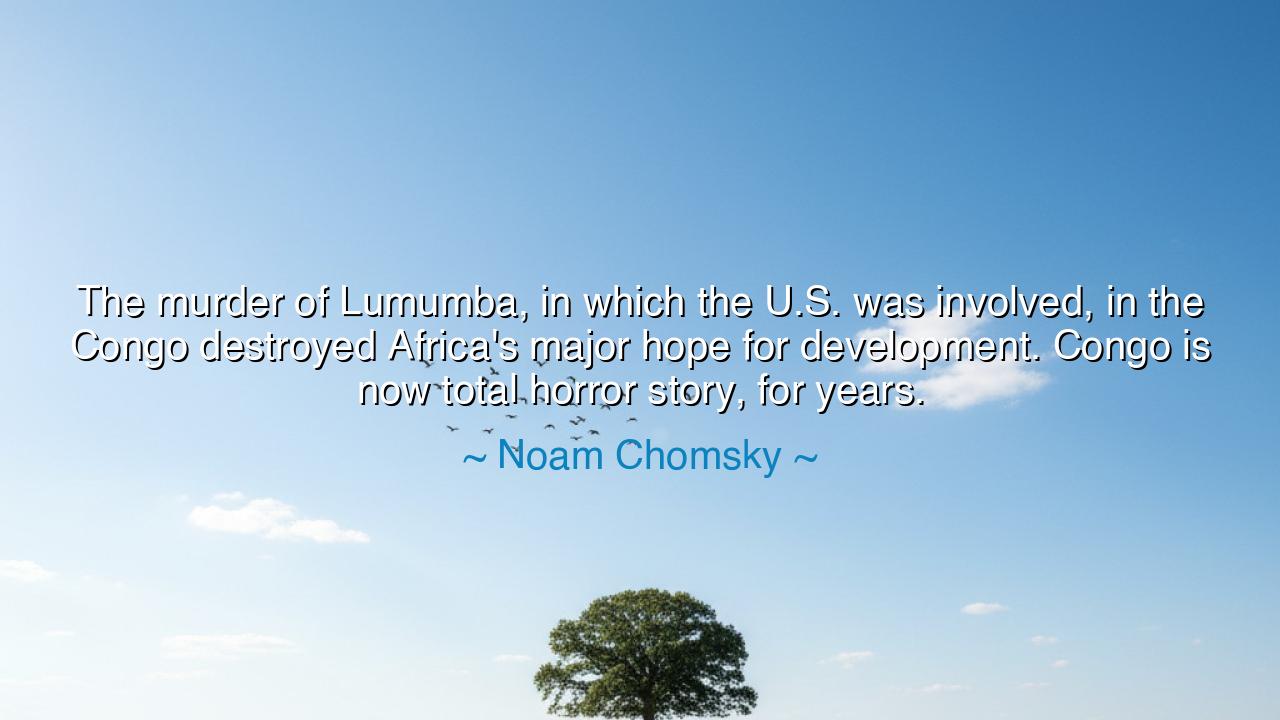
The murder of Lumumba, in which the U.S. was involved, in the
The murder of Lumumba, in which the U.S. was involved, in the Congo destroyed Africa's major hope for development. Congo is now total horror story, for years.






“The murder of Lumumba, in which the U.S. was involved, in the Congo destroyed Africa's major hope for development. Congo is now total horror story, for years.”
Thus spoke Noam Chomsky, the relentless voice of conscience in an age of power and deceit. In these words lies not merely a statement of history, but a lamentation for a continent betrayed. For Patrice Lumumba, the first Prime Minister of the Congo, was more than a man—he was a symbol of Africa’s awakening, the flame of independence burning against the long night of colonial chains. His murder in 1961 was not only the death of a leader, but the crucifixion of a dream—a dream of dignity, unity, and self-determination for all of Africa.
To understand Chomsky’s words is to feel the sorrow of a people whose future was stolen at the hour of its birth. The Congo, vast and rich in gold, copper, and diamonds, had suffered centuries of exploitation under the rule of foreign masters. When freedom finally dawned, Lumumba rose like the morning star—young, eloquent, and filled with fiery faith in his nation’s destiny. He spoke of Africa’s right to govern itself, to use its wealth for its own children, not for the empires that had bled it dry. But such words struck fear into the hearts of those who thrived on Africa’s suffering. And so, the forces of greed conspired. Within months of independence, Lumumba was betrayed, imprisoned, and executed, his body dissolved in acid, his nation plunged into darkness.
Chomsky, in his truth-telling, unmasks the hand of empire—for the tragedy was not born of Africa alone. The United States, fearing Lumumba’s alliance with the Soviet Union, joined Belgium and local conspirators in removing him, choosing control over justice, and power over humanity. Thus began the long shadow of foreign intervention in Africa’s fate, where the riches of the land became the curse of its people. The horror story, as Chomsky calls it, did not end with Lumumba’s death; it spread through decades of war, corruption, and the suffering of millions, as the Congo became both a mirror and a warning for the world.
But let not despair be the only harvest of this memory. For even in betrayal, there lies the seed of awakening. Lumumba’s spirit did not perish—it lives in every African child who dreams of a better future, in every voice that dares to speak against tyranny, in every heart that remembers that freedom cannot be killed, only delayed. His death revealed the cost of courage, and the power of truth to threaten even the mightiest. Like Socrates who drank the hemlock, like Christ who bore the cross, Lumumba’s sacrifice became immortal because it was made for the liberation of others.
We must look upon the Congo not as a distant tragedy, but as a lesson written in blood and fire. It teaches that when the strong conspire against the just, history itself weeps. It teaches that freedom without vigilance becomes illusion, and that nations which sell their souls for gold or power will one day awaken in ruins. And yet, it also teaches that even in the ashes, there remains the unquenchable ember of resistance—the human will to rise again.
In our own time, when injustice still prowls the earth wearing new masks, let us remember Lumumba’s name as a call to conscience. Let us speak the truth, though it offends the mighty; let us stand with the oppressed, though it costs us comfort. For the true development of humanity lies not in riches or machines, but in the moral courage to resist oppression wherever it hides. Chomsky’s words are not only a cry of sorrow, but a commandment for the living—to awaken from complacency, to see clearly the wounds of history, and to heal them with truth.
So, my children of the future, do not turn away from the tale of Lumumba. Let it kindle your compassion, sharpen your wisdom, and steel your resolve. The fearless heart is the seed of freedom, and the truth-teller is its guardian. Learn from the Congo’s suffering that progress without justice is hollow, and that silence in the face of evil is itself a form of betrayal. Stand in the light, as Lumumba once stood before his people, and know this: though empires may fall, and men may die, the spirit of truth and liberation never dies. It lives on—in you.






AAdministratorAdministrator
Welcome, honored guests. Please leave a comment, we will respond soon